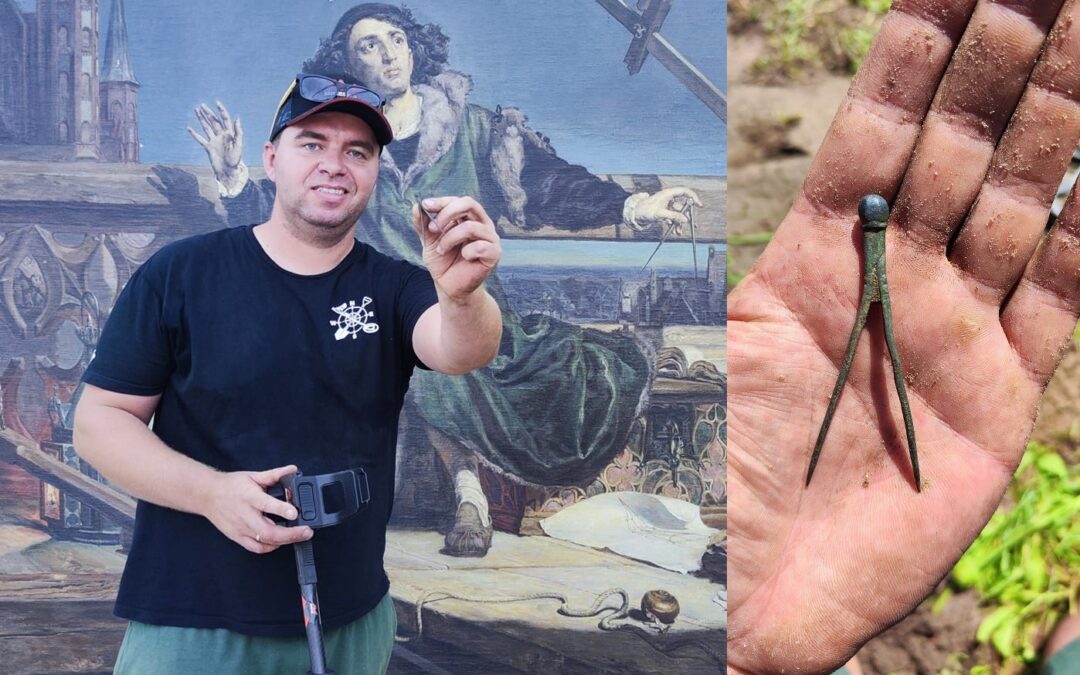Amateur archaeologists have discovered a 16th-century compass in Frombork, the town in northern Poland that was home to renowned astronomer Nicolaus Copernicus.
A local museum has speculated that the tool, which is only the third of its kind ever found in Poland, could have belonged to Copernicus, who put forward a groundbreaking model of the universe that placed the Sun, rather than the Earth, at its centre.
The compass was found in canonical gardens in Frombork by two groups of archaeology enthusiasts under the supervision of archaeologists, one of the groups, Misja Skarb, told Notes from Poland.
“In the garden where Nicolaus Copernicus conducted his astronomical observations, we found a compass dating back to the early 16th century,” Misja Skarb announced on social media.
“This amazing find not only takes us back in time to the period when Copernicus made his groundbreaking discoveries, but also opens up new possibilities for understanding his working methods,” they added.
Sorry to interrupt your reading. The article continues below.

Notes from Poland is run by a small editorial team and published by an independent, non-profit foundation that is funded through donations from our readers. We cannot do what we do without your support.
Misja Skarb’s Dawid Stenc said on the group’s YouTube channel that the canonical gardens were chosen for exploration because of a legend regarding the existence of a tunnel used by Copernicus that led between the building where he worked and the town’s cathedral.
The groups began their exploration with ground-penetrating radar surveys, which helped them find and then unearth a corner of a former residential building for monks and the entrance to its partially collapsed cellars. The discovery of the compass, however, took everyone by surprise.
An employee of the Nicolaus Copernicus Museum in Frombork, Zorjana Polenik, told reporters that the compass is made of copper alloy and can be dated to the 16th century. She added that it “could have belonged to Nicolaus Copernicus himself”.
The object will now undergo conservation work and then its fate will be decided by the local conservator of monuments. The museum hopes that it will receive the artefact for its collections.
Polenik notes that the compass is only the third such find in Poland. The first was discovered in 2005 in a courtyard of Collegium Novum, part of Poland’s oldest university, the Jagiellonion, in Kraków. The second was also found in Frombork’s canonical gardens, in 2016, and is in the museum’s collection.
Copernicus was born in 1473 in what is now the Polish city of Toruń but was then known by its German name of Thorn and was part of Royal Prussia, a province that seven years earlier had become part of the Kingdom of Poland.
A robot in the form of Polish-born astronomer Copernicus, which can hold conversations using artificial intelligence, has been unveiled in Warsaw as part of nationwide events to commemorate the 550th anniversary of the groundbreaking scientist’s birth https://t.co/1AOXLr2Odd
— Notes from Poland 🇵🇱 (@notesfrompoland) February 19, 2023
He grew up in a mainly German-speaking household, though later studied at the University of Kraków (now known as the Jagiellonian University) and was fluent in Polish.
He later lived for 30 years in Frombork, where he served as a Cathedral chapter canon, ministering and conducting astronomical observations. After his death in the city in 1543, he was buried in the cathedral.
In the garden adjacent to his canonry there was probably a so-called pavimentum, or sky observation post – a levelled platform on which the astronomer would place his measuring instruments. However, traces of this place have not yet been found, reports the Polish Press Agency (PAP).
Main image credit: MISJA SKARB / Facebook

Alicja Ptak is deputy editor-in-chief of Notes from Poland and a multimedia journalist. She has written for Clean Energy Wire and The Times, and she hosts her own podcast, The Warsaw Wire, on Poland’s economy and energy sector. She previously worked for Reuters.



















